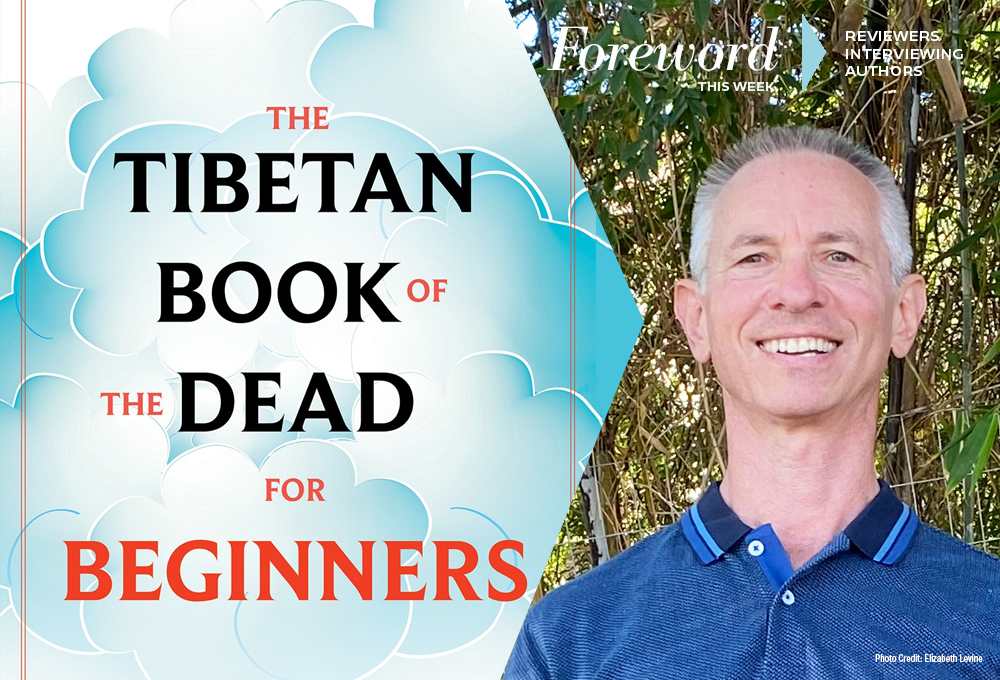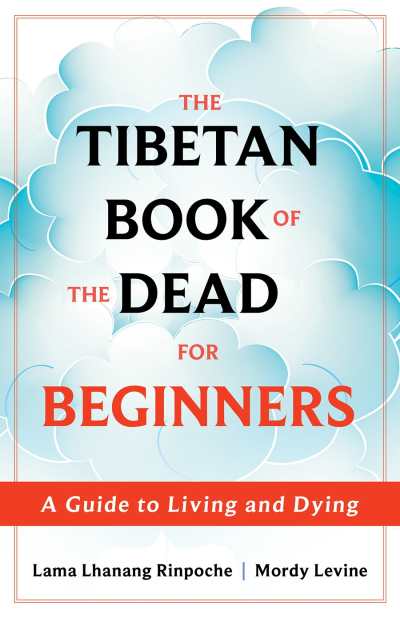Reviewer Rebecca Foster Interviews Mordy Levine, Co-author of The Tibetan Book of the Dead for Beginners

When it comes to religious and spiritual matters, what don’t you believe?
That “don’t believe” question is interesting because it might also be considered irrelevant: as in, just because you believe in something doesn’t necessarily mean that its opposite is false—especially when contemplating the mysteries of faith.
Christian, Muslim, Jewish, Hindu, Buddhist, and countless other religions all have different, often contradictory beliefs; it’s absurd to think that only one of them has the corner on truth.
In the interview below, Mordy Levine says,

“You don’t need to be a Buddhist to believe in karma … How we speak or act at this moment determines our experience in the next moment. How we live today impacts how we live tomorrow … If we love unconditionally, love will come to us. … Good intention yields good karma, and vice versa. If our intentions are full of friendliness, that will generate good karma.”
Don’t let the word “karma” get in the way. It’s difficult to imagine a prophet from any religion disagreeing with that point of view.
Rebecca Foster reviewed Mordy’s The Tibetan Book of the Dead for Beginners in the latest issue of Foreword—let’s listen in.
Before reading your book, I’d always perceived of The Tibetan Book of the Dead as something esoteric, even creepy. Where do you think such a misconception comes from?
This misconception comes from two places:
a) The original text was geared toward advanced practitioners. As such, the language and concepts are not going to make sense to those who have not practiced Tibetan Buddhism for years. It would not be dissimilar to a high school student trying to read a PhD dissertation on an esoteric topic in math.
b) The first translation by Dr. W.Y. Evans-Wentz in 1927 was not accurate in several regards. This includes an incorrect title, for example. The actual name of the original teachings in English is “Liberation through Hearing in the Intermediate State”—not The Tibetan Book of the Dead (which he co-opted from The Egyptian Book of the Dead, which has nothing to do with it).
Like other scriptures, The Tibetan Book of the Dead was written many centuries ago, yet the value of its practical wisdom remains. How would you account for that timelessness?
The book is timeless, in my opinion, because it addresses the following issues that impact all sentient and human beings for all time:
—How will we die? Will it be in peace or distress?
—Will we be reborn in an auspicious family or environment?
—How can we experience joy and peace now, so that as we live the rest of our lives, and approach the dying process, we can continue to live in that manner?
Can you tell us briefly what the bardos are in Buddhism, and what it’s important for readers to know about them?
From a Buddhist perspective, after death the consciousness experiences an intermediate, transition-like state until it is reborn in a new body. The period of time until rebirth is known as the Intermediate State, or the bardo. The English translation for the bardo, appropriately enough, is “gap.”
The Tibetan Book of the Dead not only describes what happens to us when we die, it also details what we can do to improve our experience in the bardo and prepare for a good rebirth. As in The Tibetan Book of the Dead, this [for beginners] book focuses especially on the following two bardos, given our desire to prepare ourselves for death and what comes after this life:
The Bardo of Dying—The time period when our body is in the process of dying. We feel at peace as we remember past positive actions, and fearful as we recall negative actions.
The Bardo of Luminosity—Our body and brain are dead. We experience visionary and auditory sensations not unlike the dream state while sleeping when we are alive. This can include the appearance of ghosts, demons, gods, as well as a judge of our karmic account—all created by our state of mind.
Karma is a core idea in The Tibetan Book of the Dead, and therefore in your book, too. How would you define it?
You don’t need to be a Buddhist to believe in karma, also known as the Law of Cause & Effect. How we speak or act at this moment determines our experience in the next moment. How we live today impacts how we live tomorrow, the next day, the next week, month, year—and, when you believe in rebirth, in our future lives.
If we love unconditionally, love will come to us. When we close our heart, no one wants to be around us. If you really want to know your karma, look at yourself in the mirror. How we are now results from what we have done in our life until now.
Our karma in the future is determined by what we are thinking, talking, and saying now. Our actions result in consequences. And when we speak of action, we refer to physical action, speech, or thought.
Our intention precedes or triggers our thoughts, speech, or actions. Intention is the basis of karma. Good intention yields good karma, and vice versa. If our intentions are full of friendliness, that will generate good karma. If our mind’s intentions are selfish and full of pride, then that will generate negative karma.
We develop habits of body, speech, and mind that we continue to reinforce—until we break the habit.
Mindfulness and meditation are so familiar as to seem like New Age clichés. To what extent are these practices essential to Buddhism?
Mindfulness practice and meditation are essential to Buddhism, although they are a small narrow segment of Buddhist practices. In addition to mindfulness meditation, for example, Buddhism also focuses on concepts like impermanence, compassion, karma, etc. These additional aspects of Buddhism differentiate the Buddhist world from a simple mindfulness practice. For example, a sniper could practice mindfulness to become a better killer. So, mindfulness by itself without additional teachings (from any religion) is limited, and potentially harmful.
How did the pandemic alter, or determine, the way you wrote about end-of-life preparations?
As we wrote this book, COVID-19 raged around the world. That was our motivation to write this book and get it out there as soon as possible. Millions of people died worldwide, with many people dying alone in hospitals without the comfort of family, friends, and loved ones by their side.
No one knows when our end will come. Whether we die alone or with loved ones, unexpectedly or after a long illness, after a long life or a shorter one, many people appear to be ill-prepared for the time of death.
In most contemporary Western cultures, if death is discussed at all, it comes in hushed voices. We shield ourselves and our children from any meaningful discussion of the end of life or what happens after. Death is feared, and speaking of it creates discomfort. It is rarely discussed openly.
Western culture today tends to hide our seniors away in nursing homes or senior living centers—where we can visit them periodically. They are left to navigate the end of their lives with professional caretakers. Families rush in for the final lap, often feeling fear, stress, great emotion, and little sense of how to accommodate or support their loved one.
Regardless of how and where we live our final years, and whether we see death coming or not, it will touch us all. But we don’t have to be afraid. We can die in peace. With loved ones around us supporting us, it may even be even a celebratory experience.
You are the president of Jigme Lingpa Center, the nonprofit organization directed by your co-author, Lama Lhanang Rinpoche. What programs does the Center run, and what is its mission?
Jigme Lingpa Center is a nonprofit organization (501c3) led by Lama Lhanang Rinpoche. Our mission is to generate benefit for all sentient beings through the dissemination of the Buddha’s teachings of wisdom and compassion. Lama Lhanang’s personal mission is to create world peace through inner peace.
At our current location, Jigme Lingpa Center offers public talks, classes, practices, and retreats for the public, as well as for Tibetan Buddhist practitioners. Our activities include meditation classes, Feng Shui classes, yoga classes, and programs to help the elderly, refugees, immigrants, and the less fortunate. In addition, we offer retreats and practices on the various teachings of the Buddha.
Rebecca Foster
